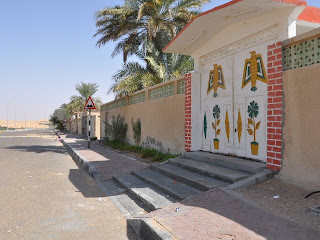- We're still living at the Liwa hotel. We didn't take the big villa because there were too many pigeons already living there... we've decided to wait (another month at least) for the newer, nicer apartments;
- Living out here means getting up around 5:30am every day to arrive at work before 7:30. The morning always starts off with a school assembly and announcements in the courtyard, and includes a girl singing a part of the Koran. I don't know what she's saying, but it's beautiful to listen to (and the only time the students are actually quiet at all);
- Work is going well. I've been super busy and spending so much time in front of my computer that I don't even want to write e-mails in the evening (ergo the lack of updates);
- We made a valiant attempt to start a regular work-out schedule at the gym room in the hotel, in order to offset the effects of the breakfast buffet and a generally sedentary lifestyle. We managed to go 4 times the first week, 3 times the next week and once last week;
- Plans to see Margaret Atwood at the Dubai Literary Festival next weekend have been stymied as she is no longer coming. She's boycotting the festival because another author has been barred for writing a book containing "offensive content" about the Middle East;
- My Korean Pension payment finally came through, two weeks late and for the wrong amount. Happily, I was able to get it worked out with a lot of help from the Education Office in Gwangju. It's not a nice final Korean experience at all;
- The English teachers at my school treated me to some traditional "foule", or beans, made with tomatoes, spices, cucumbers and eaten with flat bread, then followed by strong, sweet tea because "foule makes you want to sleep";
- We've seen more camels wandering around lately - like bigger herds of them. We also caught sight of a few oryx (I think - gazelle type things with long horns) eating by the side of the road.
- I have a residence visa now - it's pretty and pink and fills up a whole page in my passport.
- There's a rumour about that we might get a week off this semester (it isn't in the regular school calendar), but we aren't sure when. Should we a) do a live aboard dive trip off a dhow in Oman or b) go to Egypt to see the pyramids?
- I've been waiting and hoping the new apartments would come through quickly, as it is pretty difficult to get on with life from a hotel in the middle of the desert, with no internet, or computer during the weeks.
- It's been a time for catchup on reading, getting guitar skills up to scratch, and generally finding anything to keep myself busy, including not letting room service come in to tidy the room, and making sure the washing is up to scratch. It's been a good holiday from the hectic business, and long teaching hours that marked the English Villiage job in Korea.
- I went to see Iron Maiden last weekend. It was fantastic, and only having about 2000 people, fairly intimate. It was also a really interesting cultural experience and rather strange seeing some women who were in Iron Maiden t-shirts and jeans, still constantly adjusting their headscarves to keep their head covered. I'm guessing about half the crowd had travelled from nearby middle-eastern countries - Iran, Iraq and Egypt included - just for the day, to watch the concert. They enjoy the music back home, but everything is so restricted, that they would otherwise never have a chance to watch their heroes live. I befriended a guy called Aiden, who emphatically invited us to stay at his home in Iran, whenever we have the chance to travel there. He had stories to tell. We'll definitely make the effort to get there.
Hope you've enjoyed this... it really is such a new and different experience from anything that we've lived before that it's a bit hard to choose what to write about! Thanks for reading, and we'll do our best to update more frequently from now on.









